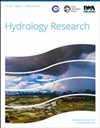埃塞俄比亚中部上阿瓦什子流域的时空补给估算
IF 2.4
4区 环境科学与生态学
Q2 Environmental Science
引用次数: 0
摘要
要做出可持续的地下水管理决策,就必须了解特定地点水预算计算的空间分布和季节波动情况。本研究旨在估算阿瓦什子流域上游的补给时空分布,该流域的地下水正被大量抽取用于生活、工业和灌溉用水。我们使用基于地理信息系统的空间分布式水平衡 WetSpass-M 模型估算了空间和长期的月均、季均和年均地下水补给量。物理参数(土地利用、土地覆盖、土壤和坡度)的分布网格图和月度气候记录(降雨量、最高和最低温度、风速)被用作模型输入。WetSpass-M 模型估算的补给量与使用自动数字滤波基流分离法独立计算的补给量进行了验证。主要由于土壤质地和土地利用的变化,年降水量(1,032 毫米)分布为蒸发(45%)、地表径流(42%)和地下水补给(11%)。含壤土的森林和草地补给量高,而含粘土的建筑密集区补给量低。据估计,8 月至 9 月的补给量最大,而 11 月至 12 月的补给量最小。了解地下水补给的空间和季节变化对于地下水资源的可持续利用、适当管理和规划非常重要。本文章由计算机程序翻译,如有差异,请以英文原文为准。
Spatiotemporal recharge estimation in the upper Awash sub-basin, central Ethiopia
Sustainable groundwater management decisions require an understanding of the spatial distribution and seasonal fluctuations of site-specific water budget computations. This study aims to estimate the spatiotemporal distribution of recharge in the upper Awash sub-basin where the groundwater is experiencing intensive abstraction for domestic, industrial, and irrigation water uses. We estimated the spatial and long-term average monthly, seasonal, and annual groundwater recharge using a GIS-based spatially distributed water balance WetSpass-M model. Distributed grid maps of physical parameters (land-use land cover, soil, and slope) and monthly climatological records (rainfall, maximum and minimum temperature, wind speed) were used as model inputs. The WetSpass-M model estimated recharge is validated with the independently computed recharge using the automated digital filtering baseflow separation method. Attributed mainly to variability in soil texture and land use, the annual precipitation (1,032 mm) is distributed as evapotranspiration (45%), surface runoff (42%), and groundwater recharge (11%). Forest and grass areas with loamy sand, have high recharge, while built-up areas with clay soil have low recharge. August to September is estimated to have the largest recharge, while November to December has the lowest. Understanding the spatial and seasonal variability of groundwater recharge is important for sustainable utilization, proper management, and planning of groundwater resources.
求助全文
通过发布文献求助,成功后即可免费获取论文全文。
去求助
来源期刊

Hydrology Research
Environmental Science-Water Science and Technology
CiteScore
5.30
自引率
7.40%
发文量
70
审稿时长
17 weeks
期刊介绍:
Hydrology Research provides international coverage on all aspects of hydrology in its widest sense, and welcomes the submission of papers from across the subject. While emphasis is placed on studies of the hydrological cycle, the Journal also covers the physics and chemistry of water. Hydrology Research is intended to be a link between basic hydrological research and the practical application of scientific results within the broad field of water management.
 求助内容:
求助内容: 应助结果提醒方式:
应助结果提醒方式:


